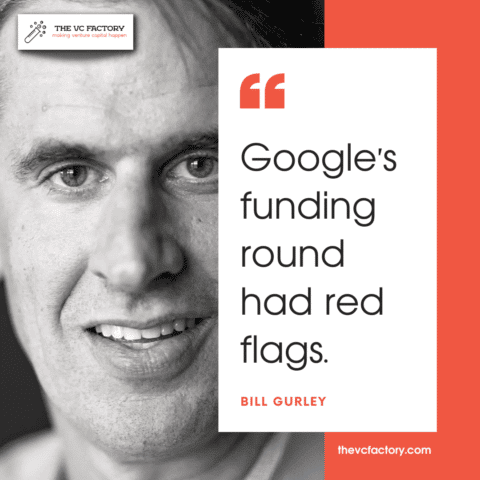“Google’s funding round had red flags.” – Bill Gurley

Few Venture Capital firms are more elite than Benchmark, and few Venture Capitalists are more iconic than Bill Gurley. In a recent podcast, he illustrates why VCs must break their mental models by recounting why he refused an early investment in Google. After Larry Page and Sergey Brin pitched Benchmark to raise their Series A round in 1999, Benchmark passed on the opportunity to make a deal that eventually returned “10,000x”. Having long reflected on the reasons why it happened—red flags abounded, he says—Bill Gurley drew lessons that would determine his investing style for decades to come. In this article, I use real-life examples to illustrate why VCs should have a “What can go right” mentality to achieve the top-decile returns that persistent elite VC firms produce fund after fund.
In This Article
Venture Capital’s Deadly Sin: Errors of Omission
Investors make two kinds of mistakes when they commit time and money to a startup:
An error of commission is an active decision to invest in a company that ends up having a poor exit value or going into bankruptcy. The situation could stem from a due diligence failure, a change in market sentiment, poor execution, or bad luck. The consequences of such errors have a cost, as the initial investment may be lost. Examples: Investing in Theranos (due diligence failure) or Quibi (wrong market vision).
The second type is an error of omission. In this case, the mistake comes from not investing in a company that turns out to be a huge success. VCs pass on investment opportunities for a variety of reasons, some of which are implicit or even unconscious. The immediate consequences of such errors are a loss of opportunity, but long-term consequences are worse (see below). Examples include not investing in Airbnb because you thought people would get raped, or missing Uber’s first round because you didn’t like the idea of the co-Founders hiring a manager to do the job (here’s to you, GaryV).
I thought someone would get raped or murdered and the blood would be on their hands. Airbnb is a $10 billion company I’m not an Investor in.
Chris Sacca – Lowercarbon Capital (Read More here)
VCs are expected to make the first kind of mistake. In an industry dominated by the power law of returns, most investments return less than the money injected initially. In contrast, making errors of omission is much more damaging to investment professionals.
LPs pay handsome management fees and carry to GPs boasting early access to quality deal flow and a superior ability to recognize exceptional Founders. It is hard to justify such emoluments after missing too many unicorns.
Another reason why errors of omission are so damaging to VCs is that there are only a handful of potential 100x startups raising money every year. Failing to invest in one may seal the fund’s performance—and sometimes the VC firm’s ability to raise the next one. Read the article below for more statistics on Venture Capital fund returns over time.

Go Further: Venture Capital Returns: True Lies?
This statistical reality explains why some investment funds, led by Tiger Global and consorts, aggressively invested in startups during the last bubble. They did so at any price and often with very little due diligence and covenants (such as Board seats). The objective was to get “unicorn real estate” to make a meaningful return on their multibillion-dollar funds.
Although it has become somewhat cool to advertise misses—a trend Bessemer Venture Partners started with their Anti Portfolio—the stark reality is that VC firms need to produce top-quartile returns to ensure longevity. They can’t achieve such performance if they overlook too many golden investment propositions they are presented with.
Why Bill Gurley Missed The Google Opportunity
Bill Gurley has long been adamant that successful VCs are able to break their mental models. He learned the hard way that establishing hard rules could be a mistake. “Strong opinions, held loosely” is a rule of thumb he likes to repeat. In a recent interview with Tim Ferris, Bill Gurley reminisces about two red flags occupying his mind when he met Page and Brin:
- Google was the 12th search engine to launch. In such a crowded market, competitors like Yahoo! and Excite were not in good shape
- More importantly, Page and Brin were two Stanford PhD dropouts who claimed they would make great co-CEOs
It was inconceivable in an era where Founders were often removed from their roles before taking their company public that two technical entrepreneurs would be business savvy enough to build a tech giant. It’s hard to imagine in today’s Founder-friendly VC market, which owes to the successes of figures like Mark Zuckerberg (aided by Sheryl Sandberg) and Andreessen Horowitz’s investment in the Founder-CEO model to alter this perception. Google’s success, led by the trio of Larry Page, Sergey Brin, and Eric Schmidt, was pivotal in this evolution.
Bill Gurley was not the only one to miss Google’s potential. David Cowan of Bessemer Ventures notoriously avoided meeting Larry Page and Sergey Brin while they were still working on the PageRank prototype, completely missing out on the opportunity to invest. David Warmuz, who was approached to write the first $100,000 ever raised by Brin and Page, passed for fear of competitive pressure.
We passed on the opportunity, at the time there were 1000’s of search engines, one being launched every day, so for us we found it hard to see how they could take on AltaVista that was a power house at the time.
David Warmuz – Trillion.com
However, other VCs backed Google’s Founders. Was it a fluke? With an honest mind that characterizes him almost uniquely in his industry, Bill Gurley mentions that the two best VCs of the time, Sequoia’s Michael Moritz and Kleiner Perkins’ John Doerr, agreed to fund Google’s round at an outrageously high valuation for a company with 25 employees and no business model (AdWords launched in 2000).
What inspired two legendary venture capitalists—and a few other famous names, including Arnold Schwarzenegger and Shaquille O’Neal—to join forces on Google’s $25 million round? I assume that Arnie and Shaq were just along for the ride, as they likely had their fingers in many pies during the dot-com bubble. According to Bill Gurley, Moritz and Doerr were able to shatter their preconceived notions of what a startup needs to be successful.
In other terms, they broke their mental model.
How To Break The Mental Model
I’ve written extensively about the cognitive biases at play in VCs’ investment decisions.
Investors are primed by their personal history, professional experience, and what Bill Gurley calls a “bedrock” of knowledge they built over time. Since they have to make judgments amid uncertainty, they are likely to fall prey to cognitive biases.
In the Google case, Benchmark’s partners seem to have succumbed to a bias born of the representativeness heuristic (see the article below for more explanations). They didn’t have available in their minds examples of phD dropouts building a successful company in what seemed to be a difficult market. In other words, their mental shortcut for a successful Founder excluded individuals like Page and Brin.
According to Bill Gurley, the key to these crazy bets is to focus not on what can go wrong, but on what can go right. Despite the two tech entrepreneurs’ lack of experience as CEOs, they were credited by Sequoia and KP for their vision and ambition. Besides, the potential reward far outweighed the loss. If successful, Investors could have made many times their money on their initial investment. If not, all they’d have lost are the funds they put in. “You can only lose 1x your money” is a common saying in VC.
Easier said than done? I think so. Investing in startups requires going against millions of years in our species’ evolution. Our brains were trained to make fast decisions based on our intuition, which goes wrong when the right circumstances are not met.
Successful Investors are able to tear down the walls built around previous rules. Another VC Hall of Famer, Sequoia’s Doug Leone, reminds us that most technology breakthroughs of the past half-century were black swans nobody predicted.
The biggest outcomes come when you break your previous mental model. The black-swan events of the past forty years—the PC, the router, the Internet, the iPhone—nobody had theses around those. So what’s useful to us is having Dumbo ears.
Doug leone – Sequoia (Source: Website)
After much analysis, I concluded that elite VC firms make crazy bets that pay out immensely because they don’t get in the way of their daring partners’ decisions. Investment committee rules allow them to allocate resources to non-obvious, disruptive ideas.
However, it all starts with an out-of-the-box thinker able to recognize an opportunity nobody else sees.
Is Bill Gurley A Promotion–Focused Venture Capitalist?
I presented my adaptation of the Regulatory Focus Theory to Venture Capital investing in various articles including one on how elite VCs make the best use of the power law. Bill Gurley provides another illustration of this divide between “promotion-” and “prevention-focused” professionals in the investment community.
He mentions Oaktree’s Howard Marks’ mantra that you must be “contrarian but right.” It’s easy to be right when everyone is. For example, it’s much safer to launch a social media than a flying car—or a space shuttle. However, making contrarian capital allocation decisions requires a peculiar mentality.
Marks, who regularly shares wisdom acquired from decades of public stock investing, calls such mentality second-level thinking. Since investing in the same companies as everybody else will produce average returns, it takes a different approach to generate over-average performance.
In his words, “second-level thinking is deep, complex, and convoluted”. It requires asking one’s self questions such as “What outcome do I think will occur?”, “What’s the probability I’m right?”, and “How does my expectation differ from the consensus?”
I’m often wrong. But when I’m right, I’m f*cking right.
Chris sacca – Lowercarbon capital (source: 20VC)
Many elite VCs display second-level thinking. They don’t care if they’re wrong, and they swing big. Chris Sacca, one of the most successful Angels of the last decades, uses flowery words to describe this ability to be right when no one believes in the opportunity. He focuses not on the loss but on the potential gain. It’s an anti-loss aversion approach.
Promotion-focused Venture Capitalists are able to break their mental models, and see the diamond in the rough, thanks to a unique ability to focus on the 10% chance of making it big rather than the 90% chance of losing the capital they invested.
Conclusion: tl;dr
The ability to make crazy bets on startups is an essential part of VC success. Elite VCs have a promotion-focused mentality and the courage to think differently from everyone else. They see beyond the obvious and focus on potential outcomes that seem unlikely to most.
With the right mindset, Investors can make well-informed decisions about investing in startups with greater chances for success than failure. By embracing second-level thinking, Venture Capitalists will increase their chance of finding those potentially lucrative diamonds in the rough that could revolutionize industries and create massive returns on investment.

